
Marvel Comics is the brand name and primary imprint of Marvel Worldwide Inc., formerly Marvel Publishing, Inc. and Marvel Comics Group, a publisher of American comic books and related media. In 2009, The Walt Disney Company acquired Marvel Entertainment, Marvel Worldwide's parent company.

Steve Englehart is an American writer of comic books and novels. He is best known for his work at Marvel Comics and DC Comics in the 1970s and 1980s. His pseudonyms have included John Harkness and Cliff Garnett.

Mantra is an American comic book series written by Mike Barr, mainly penciled by Terry Dodson and published by Malibu Comics in the mid-1990s, until it was purchased by Marvel Comics. Adam Hughes is credited for the character designs. After the purchase, the title was cancelled after 24 issues and revamped in a new version, with a new protagonist.

Malibu Comics Entertainment, Inc. was an American comic book publisher active in the late 1980s and early 1990s, best known for its Ultraverse line of superhero titles. Notable titles under the Malibu label included The Men in Black, Ultraforce, Night Man and Exiles.

Sersi is a fictional character appearing in American comic books published by Marvel Comics. The character is depicted as a member of the Eternals, a race of superhumans. She was also a member of the Avengers and God Squad. Sersi first appeared in the 1976–78 comic book series The Eternals.
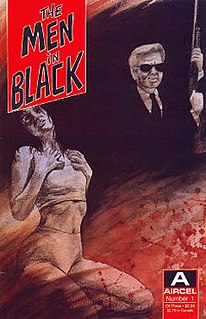
The Men in Black is an American comic book created and written by Lowell Cunningham, illustrated by Sandy Carruthers, and originally published by Aircel Comics. Aircel would later be bought out by Malibu Comics, which itself was bought out by Marvel Comics. Three issues were published in 1990, with another three the following year. It was adapted into the film Men in Black, which was a critical and commercial success, leading to three sequels and various spin-offs, as well as a number of tie-in one-shot comics from Marvel. Cunningham had the idea for the comic once a friend of his introduced him to the concept of government "Men in black" upon seeing a black van riding the streets.

Prime is a superhero character created by Bob Jacob, Gerard Jones, Len Strazewski, Norm Breyfogle, and Bret Blevins. The character debuted in Prime #1 under Malibu Comics' Ultraverse imprint, and was one of the publisher's flagship characters, and a member of its superhero team Ultraforce. The character is a thirteen-year-old boy named Kevin Green with the power to transform into the physical form of a super-powered adult, but with his adolescent mind unchanged. This is a source of conflict for the character, as he is frequently placed in situations he may not be mature enough to deal with.
The Ultraverse is a defunct comic book imprint published by the American company Malibu Comics which is currently owned by Marvel Comics. The Ultraverse is a shared universe in which a variety of characters – known within the comics as Ultras – acquired super-human abilities.
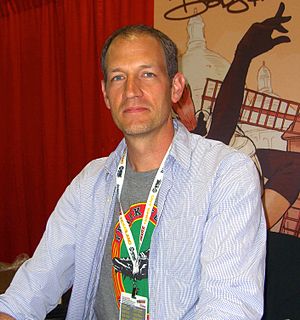
Terry Dodson is an American comic book artist and penciller. He is best known for his work on titles such as Harley Quinn, Trouble, Marvel Knights Spider-Man, Wonder Woman and Uncanny X-Men. His pencils are usually inked by his wife Rachel Dodson, who is a comic book inker and colorist.
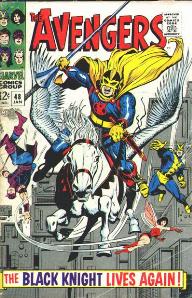
Dane Whitman or Black Knight is a fictional superhero appearing in American comic books published by Marvel Comics. The third character to bear the Black Knight name, he was created by writer Roy Thomas and artist John Buscema, and first appeared in The Avengers #47. The original Black Knight's descendant and the supervillain Black Knight's nephew, he inherited a mystical sword that carried a curse and took the Black Knight name to help restore honor, and has been a long time member of the Avengers' various incarnations as well as the Defenders, Ultraforce, Heroes for Hire, and MI: 13.
The Ultraforce is a fictional superhero group that appears in comic books published by Malibu, and later Marvel. The purpose of the group was to protect the public and keep other "Ultras" (superheroes) from becoming unruly. The group consists of various Ultras in Malibu's Ultraverse, including the super-strong Prime; Hardcase, one of the first public Ultras and the most famous; Prototype, Ultra-Tech's armored spokesperson; Topaz, warrior queen of Gwendor; the undead Ghoul, the last surviving member of the Exiles; and the mysterious Contrary, who organized the team and provided their technology.
Hardcase is a superhero that debuted in the comic book series of the same name, written by James Hudnall for Malibu Comics’ Ultraverse imprint, being one of the first series to launch the imprint. Hardcase was Tom Hawke, a Hollywood actor who became one of the first publicly known Ultras formed the first superhero team in his universe, The Squad.
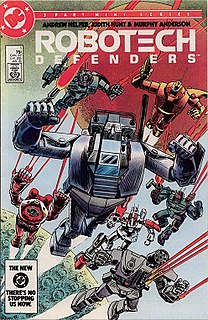
Robotech comics first officially appeared in print in 1985, though Comico published the first issue of its license from Harmony Gold USA under the Macross name.

Sludge is a comic book series from Malibu Comics, set in the Ultraverse. It was created by Steve Gerber, Gary Martin and Aaron Lopresti. It depicted a dirty cop called Frank Hoag who was killed by the local mafia and was transformed after his death into a superpowered and viscous creature, called Sludge.

The Avengers/Ultraforce event was a two-part intercompany crossover between Malibu Comics and Marvel Comics. The first issue, Avengers/Ultraforce, was written by Glenn Herdling with art by Angel Medina and M. C. Wyman. The sequel, Ultraforce/Avengers, was written by Warren Ellis with art by George Pérez, who also illustrated wraparound covers on both issues.
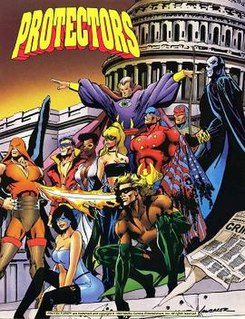
The Protectors was a 20-issue comic book series published by Malibu Comics from 1992 until 1994. Originally meant to be a six-issue series, response was positive enough that Malibu decided to make the series ongoing. The series was cancelled so that, according to Malibu, they could focus more on the "Ultraverse" line.
One of the key aspects of the Modern Age of Comic Books was that it was the beginning of big events. In 1984, Marvel Comics debuted the first large crossover, Secret Wars, a storyline featuring the company's most prolific superheroes, which overlapped into a 12-issue limited series and many monthly comic books. A year later, DC Comics introduced its first large scale crossover, Crisis on Infinite Earths, which had long-term effects on the "DC Universe" continuity.
Future Shock is a bestselling 1970 book by futurist Alvin Toffler.
Siren, in comics, may refer to:
Night Man is a fictional superhero created by Steve Englehart and Rick Hoberg, who exists in the Ultraverse line of comics and possesses the super ability to hear the evil thoughts of those people around him. His real name is Johnny Domino, a talented San Francisco saxophonist. He was adapted in an live-action superhero television series from 1997 to 1999.













